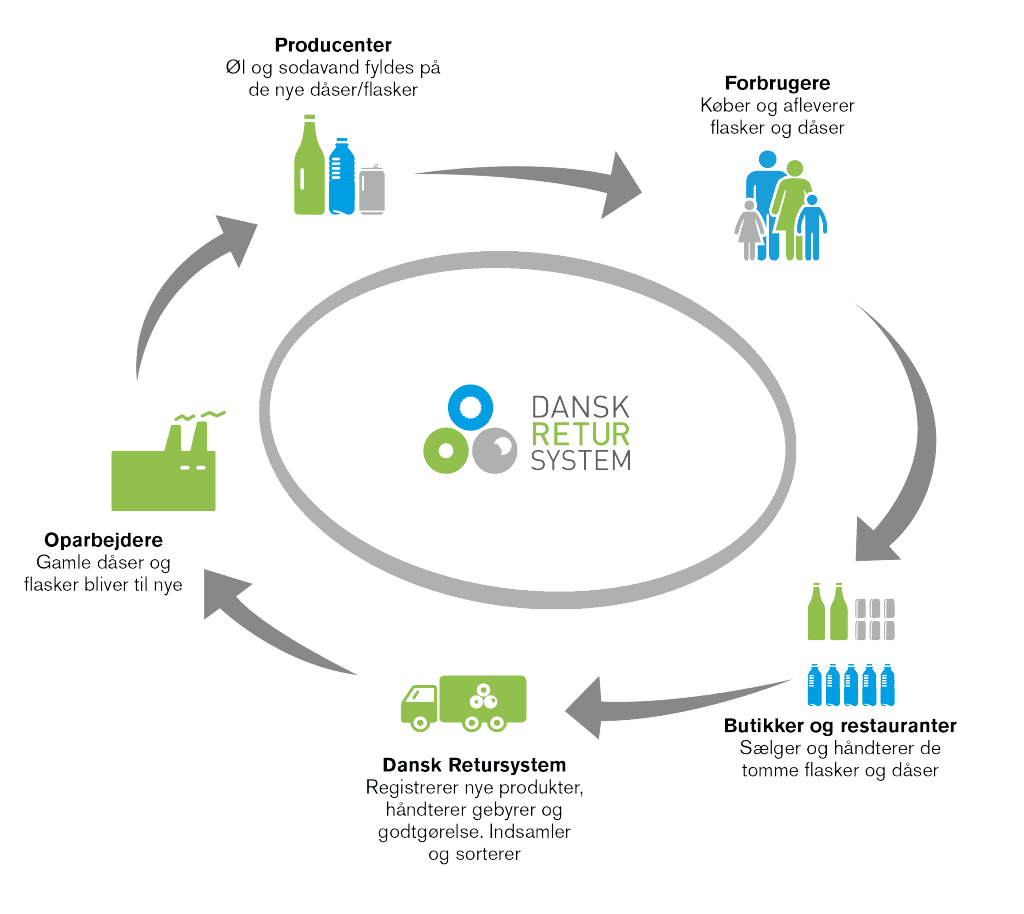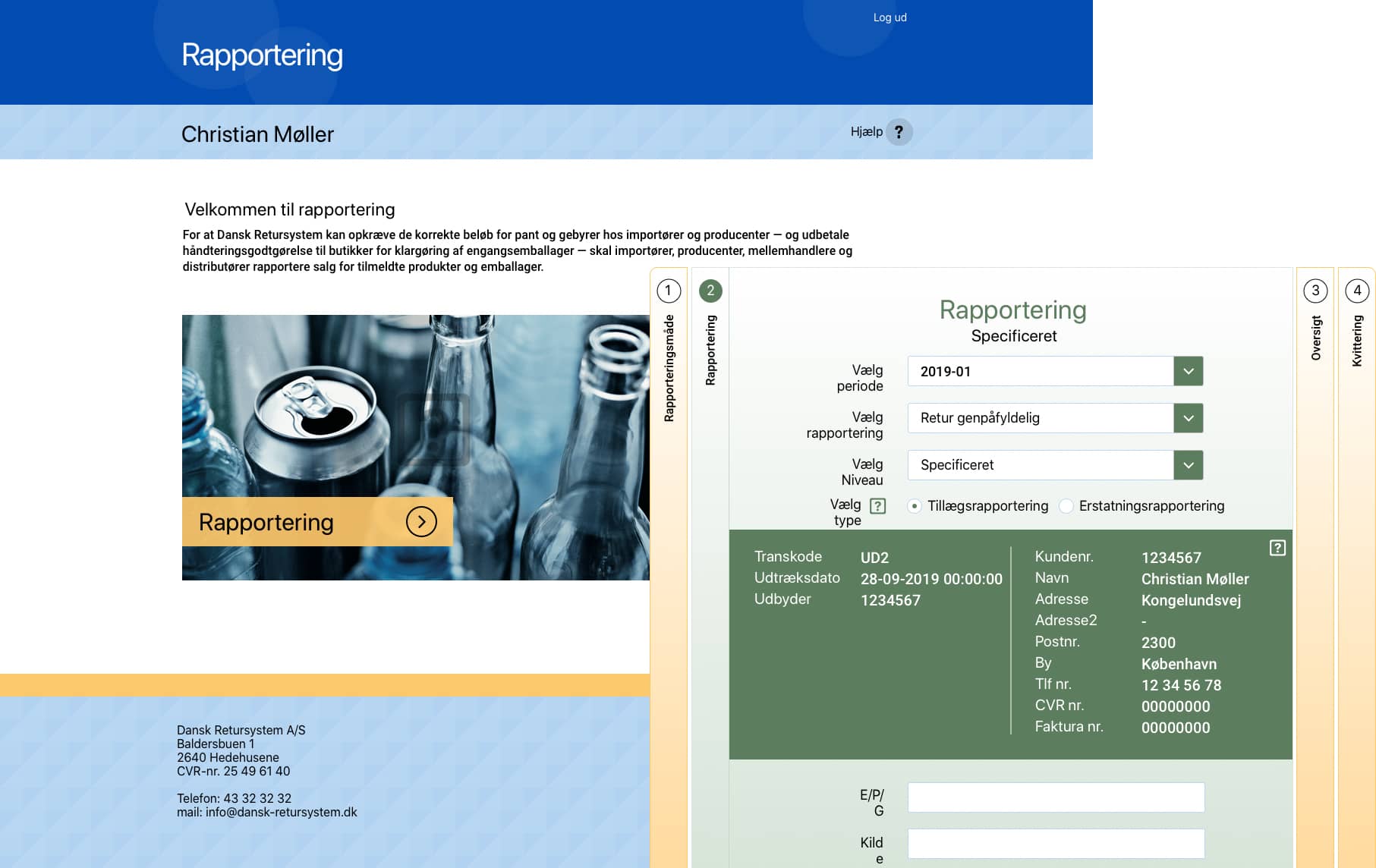Danish return system
The Deposit Portal
Bottle deposit registration and reporting
Dansk Retursystem is a non-profit company owned by the breweries in Denmark. The company has a monopoly on collecting bottle deposits in Denmark and has a turnover of close to 2 billion DKK annually. Dansk Retursystem cooperates with over 16,000 stores, 750 manufacturers and importers and handles approximately 3,000 bottle vending machines.
Challenge
Registering and reporting recyclable packaging is more complicated than most people could imagine. There are more than 25,000 different eligible packages. On top of that they handle different types of deposits, depending on whether they are bottles that are literally recycled or packaging that is recycled to make new ones. The many different packages can even be configured differently with different types of affixed labels. Registering and reporting recyclable packaging is a less simple process than most people would imagine. In order for the packaging to be recognizable in the bottle vending machines when consumers hand them in, manufacturers and importers must have registered and set them up correctly in the system, but the challenges do not stop here. Since bottles in a sense is a financial asset, all links in the chain must report deposit transactions to an independent audit firm.
Solution
The Deposit Portal has two main functions: Deposit registration and Deposit reporting. The former is basically about offering a digital registration system with a user-friendly service to importers and manufacturers that ensures as fast and efficient a process as possible.
The portal is built on a Orckestra Composite C1 platform. This provides access for everyone to make the required reporting of deposits. The system must be able to be used both by Carlsberg and by a small kiosk, so that the process for reporting is individualized accordingly. The large reporting with 150,000 units at a time must be able to handle sore bulk uploads of many transactions at a time. In case of errors, it is important that the system easily identifies the error, to avoid having to analyze large amounts of data to identify an incorrect entry.
The smaller players, on the other hand, must be able to make more limited reporting manually. Dansk Retursystem has an agreement with the independent auditing company, Revisionsinstituttet A/S, ensuring that manufacturers and importers cannot see information about each other. To live up to this, reporting data is disseminated to the Audit Institute in a neutral zone outside the Danish Return System’s control.
Result
90% of all manufacturers and importers use the electronic packaging registration, registering around 6,000 new packaging annually. Dansk Retursystem’s goal of 80% of the manufacturers’ packaging registrations must be made digitally is hereby achieved.
Users are in control of the reporting. Smaller companies often use the option of downloading a template, to enter their data. “Large users” will typically have an extract from their own system that lives up to the current formatting and contains the information that must be reported.
DANISH RETURN SYSTEM
The Deposit Portal
DANISH RETURN SYSTEM
The Deposit Portal
Bottle deposit registration and reporting
Dansk Retursystem is a non-profit company owned by the breweries in Denmark. The company has a monopoly on collecting bottle deposits in Denmark and has a turnover of close to 2 billion DKK annually. Dansk Retursystem cooperates with over 16,000 stores, 750 manufacturers and importers and handles approximately 3,000 bottle vending machines.
Challenge
Registering and reporting recyclable packaging is more complicated than most people could imagine. There are more than 25,000 different eligible packages. On top of that they handle different types of deposits, depending on whether they are bottles that are literally recycled or packaging that is recycled to make new ones. The many different packages can even be configured differently with different types of affixed labels. Registering and reporting recyclable packaging is a less simple process than most people would imagine. In order for the packaging to be recognizable in the bottle vending machines when consumers hand them in, manufacturers and importers must have registered and set them up correctly in the system, but the challenges do not stop here. Since bottles in a sense is a financial asset, all links in the chain must report deposit transactions to an independent audit firm.
Solution
The Deposit Portal has two main functions: Deposit registration and Deposit reporting. The former is basically about offering a digital registration system with a user-friendly service to importers and manufacturers that ensures as fast and efficient a process as possible.
The portal is built on a Orckestra Composite C1 platform. This provides access for everyone to make the required reporting of deposits. The system must be able to be used both by Carlsberg and by a small kiosk, so that the process for reporting is individualized accordingly. The large reporting with 150,000 units at a time must be able to handle sore bulk uploads of many transactions at a time. In case of errors, it is important that the system easily identifies the error, to avoid having to analyze large amounts of data to identify an incorrect entry.
The smaller players, on the other hand, must be able to make more limited reporting manually. Dansk Retursystem has an agreement with the independent auditing company, Revisionsinstituttet A/S, ensuring that manufacturers and importers cannot see information about each other. To live up to this, reporting data is disseminated to the Audit Institute in a neutral zone outside the Danish Return System’s control.
Result
90% of all manufacturers and importers use the electronic packaging registration, registering around 6,000 new packaging annually. Dansk Retursystem’s goal of 80% of the manufacturers’ packaging registrations must be made digitally is hereby achieved.
Users are in control of the reporting. Smaller companies often use the option of downloading a template, to enter their data. “Large users” will typically have an extract from their own system that lives up to the current formatting and contains the information that must be reported.

